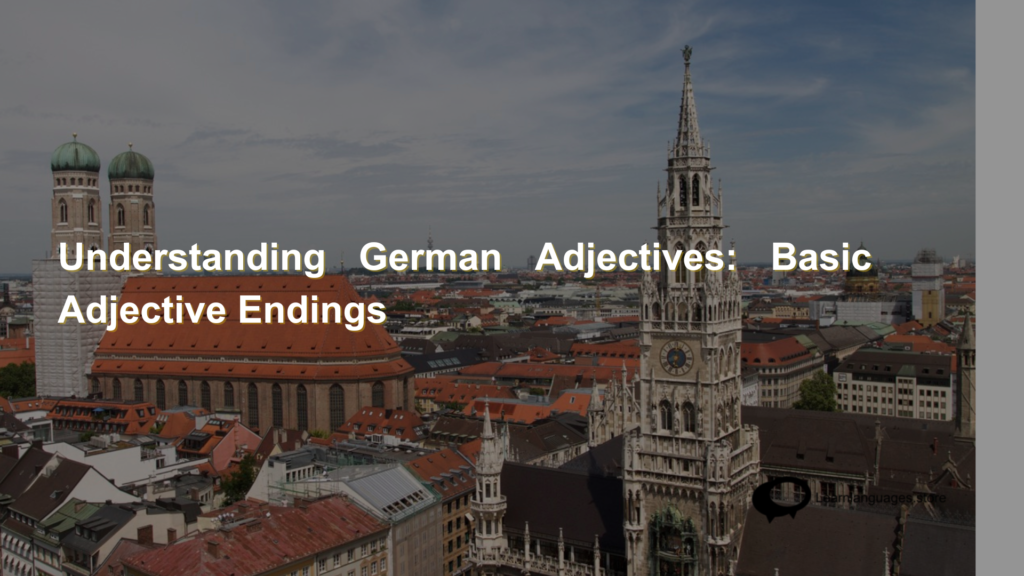Understanding German Adjectives: Basic Adjective Endings
Understanding German Adjectives: Basic Adjective Endings
Estimated reading time: 6 minutes
Welcome to the Learn Languages Store blog! In this article, we will explore an essential aspect of German grammar: adjectives and their endings. Understanding how to use adjectives correctly is crucial for expressing yourself clearly and effectively in German. We will specifically focus on basic adjective endings, using examples like “ein schöner Tag” (a beautiful day) and “der schöne Tag” (the beautiful day).

What Are Adjectives in German?
Adjectives are words that describe nouns. In German, adjectives can change their endings based on the gender, number, and case of the noun they modify. This grammatical feature is one of the key differences between German and English.
Types of Adjective Endings
German adjectives can take on three types of endings based on their usage:
- Attributive Adjectives: These adjectives come before a noun and change according to the noun’s gender, number, and case.
- Predicative Adjectives: These adjectives follow a linking verb and do not change.
- Adverbial Adjectives: These adjectives modify verbs and typically remain unchanged.
In this blog, we will focus on attributive adjectives, which are the most commonly used.
Basic Adjective Endings
When adjectives precede nouns, their endings change depending on the article (definite or indefinite), gender, number, and case. Here are some examples to illustrate how to use adjectives in different contexts:
-
Product on sale
 German B1
German B1₹32,600.00
₹42,600.00 -
Product on sale
 German A2
German A2₹24,300.00
₹32,600.00
Indefinite Article: ein (a/an)
- Sentence: Das ist ein schöner Tag.
Translation: That is a beautiful day.
Pronunciation: दास इस्ट आइख श्यूनर टाग। - Sentence: Ich sehe ein großes Haus.
Translation: I see a big house.
Pronunciation: इख ज़ेहे आइख ग्रोसेस हाउस। - Sentence: Er hat ein interessantes Buch.
Translation: He has an interesting book.
Pronunciation: एर हैट आइख इंटरेस्सेंट्स बुख। - Sentence: Wir wollen ein neues Auto.
Translation: We want a new car.
Pronunciation: वीर वोल्लेन आइख नॉयेस आटो। - Sentence: Sie trägt ein rotes Kleid.
Translation: She is wearing a red dress.
Pronunciation: ज़ी ट्रैग्ट आइख रोतेस क्लाइड।
Definite Article: der (the)
- Sentence: Das ist der schöne Tag.
Translation: That is the beautiful day.
Pronunciation: दास इस्ट डेर श्योन टाग। - Sentence: Wo ist der große Hund?
Translation: Where is the big dog?
Pronunciation: वो इस्ट डेर ग्रॉसे हंड? - Sentence: Ich sehe den alten Mann.
Translation: I see the old man.
Pronunciation: इख ज़ेहे डेन आल्टेन मैन। - Sentence: Er hat die teure Uhr.
Translation: He has the expensive watch.
Pronunciation: एर हैट दी टॉइरे उर। - Sentence: Wir besuchen die schöne Stadt.
Translation: We are visiting the beautiful city.
Pronunciation: वीर बेजुचेन दी श्योन श्ताट।
Why Are Adjective Endings Important?
Understanding adjective endings in German is crucial for effective communication. Incorrect endings can change the meaning of a sentence and lead to confusion. By mastering adjective endings, you will enhance your speaking and writing skills, making it easier to express your thoughts accurately.
How Learn Languages Store Can Help You
If you’re serious about mastering German, including the use of adjectives and their endings, consider enrolling in our A1 Level German Course at the Learn Languages Store. For just Rs. 16,300, you will receive comprehensive lessons tailored to help you learn effectively.
Our experienced instructors provide personalized attention, ensuring you grasp the nuances of the German language.
Contact Us
To learn more about our paid courses and how we can help you on your language-learning journey, feel free to contact us:
Address:
330, 3rd Floor, Big Splash (Near Vashi Bus Depot),
Sector 17,
Vashi,
Navi Mumbai, Maharashtra 400703
Phone: +91-9594113111
Email: services@learnlanguages.store
Don’t miss this opportunity to elevate your German skills! Sign up today, and let’s start this exciting journey together!










